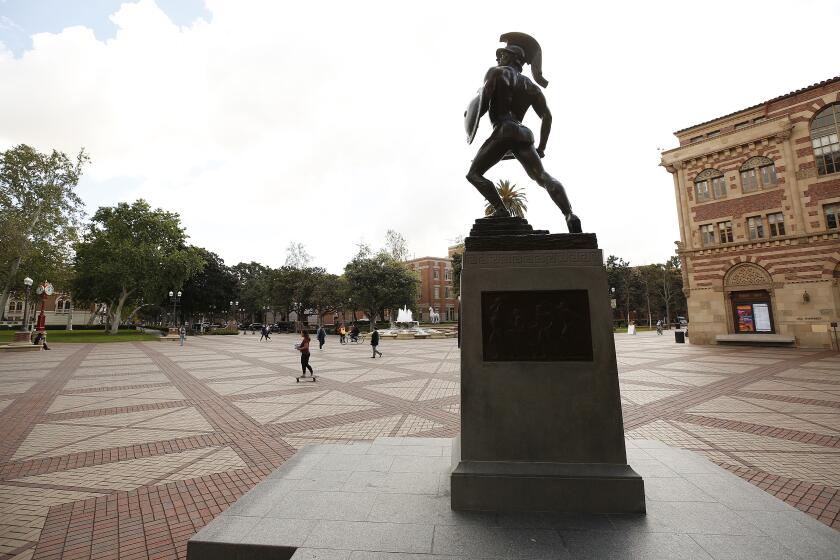Don’t blame voters for California’s mess
The Times’ May 20 news analysis of the special election results, “California voters exercise their power — and that’s the problem,” doesn’t put all the blame on voters for the state’s impending bankruptcy. Still, more needs to be said in defense of the voters who last week rejected the budget reform propositions.
Consider Proposition 1A, which emphasized in its title the “ ‘Rainy Day’ Budget Stabilization Fund” in the pamphlet sent to all voters by the California secretary of state. But Proposition 1A would have done much more than just set aside reserves during boom times. It would have allowed the governor to stop spending in certain areas and to extend certain “temporary” tax and fee increases for up to two years. It would have done much more than prescribe what to do in the boom times of a mythical tomorrow.
Also consider Proposition 1C, called the “Lottery Modernization Act.” Beneath that title lurked a scheme not just to “modernize” (in other words, expand) the lottery but also to borrow against hypothetical future earnings, thus incurring interest costs on the money that was to be borrowed.
Then there was Proposition 1E, called, “Mental Health Services Funding. Temporary Reallocation.” I have a doctorate in political science and once taught a course on public policy with a focus on health and the environment, and I still couldn’t be sure what that proposition actually proposed to do. With the help of The Times, I guessed that Proposition 1E would have reduced the money available for certain types of mental health services. The actual statement in the voter guide, however, used the weasel words “transfer funds” instead of “cuts.”
Similarly, I think it is quite understandable if voters were also confused with Propositions 1B and 1D.
In short, the crafty politicians who drafted (and titled) these ballot referendums did their best to bamboozle the public -- and I, for one, just said no.
Except for Proposition 1F, all the ballot measures were hard to parse and involved the kind of micromanagement of public policy choices that ought not to be any part of the referendum process. Moreover, none of the six propositions addressed the real problems caused by ballot-driven politics, such as the two-thirds vote rule that gives Republicans in Sacramento veto power over the budget, or the legacy of Proposition 13 that similarly handcuffs local governments. Thanks to this initiative process, voters have passed numerous measures that reserve a fixed share of the state budget for specific purposes and thus eliminate much of the discretion the Legislature has in spending taxpayer dollars and balancing competing priorities.
Instead, the politicians have apparently decided that Californians are too stupid to be part of an honest debate about how much money it takes to provide the services that voters take as their right -- and what we should do when the money isn’t there to pay for the things we want.
There are three ways we can try to pull California out of its current economic crisis:
* Try to muddle through by tinkering at the margins, an idea that went down in flames last week because voters were given ballot propositions with soothing names but murky consequences. The initiatives did not address the heart of the financial problems confronting the state.
* Calling a constitutional convention in the hope that we can start from scratch and do better.
* Putting one referendum on the ballot to undo in a single stroke all of the taxation constraints and handcuffs on the Legislature’s power to decide the state’s budget.
The third option is the best. Trying to change things piecemeal is very unlikely to work because every law that sets aside a portion of state revenues for certain programs has a constituency that would fight tooth-and-nail to save it. Think of military base closings: Because every base has a constituency that will try to save it, the best way to go about closing installations is to do so as part of a deal involving multiple base closures. Legislators can assure their constituents that they aren’t the only ones hurting and that voting for the package was the “good government” thing to do.
Until some brave politicians are willing to back a referendum that repeals California’s special-interest budgeting in one fell swoop and allows the Legislature and governor to do their jobs, California is going to stay in the financial mess it’s in. I am not optimistic that such a referendum would pass, but before we condemn California voters for their stupidity and myopia, we owe them a chance to prove the skeptics wrong. If such a referendum were to pass, the Legislature and governor would no longer be able to hide behind the defense that they couldn’t do the right thing because the voters had taken away their power to act.
Bernard N. Grofman is a political science professor and the director of the Center for the Study of Democracy at UC Irvine.
More to Read
A cure for the common opinion
Get thought-provoking perspectives with our weekly newsletter.
You may occasionally receive promotional content from the Los Angeles Times.










